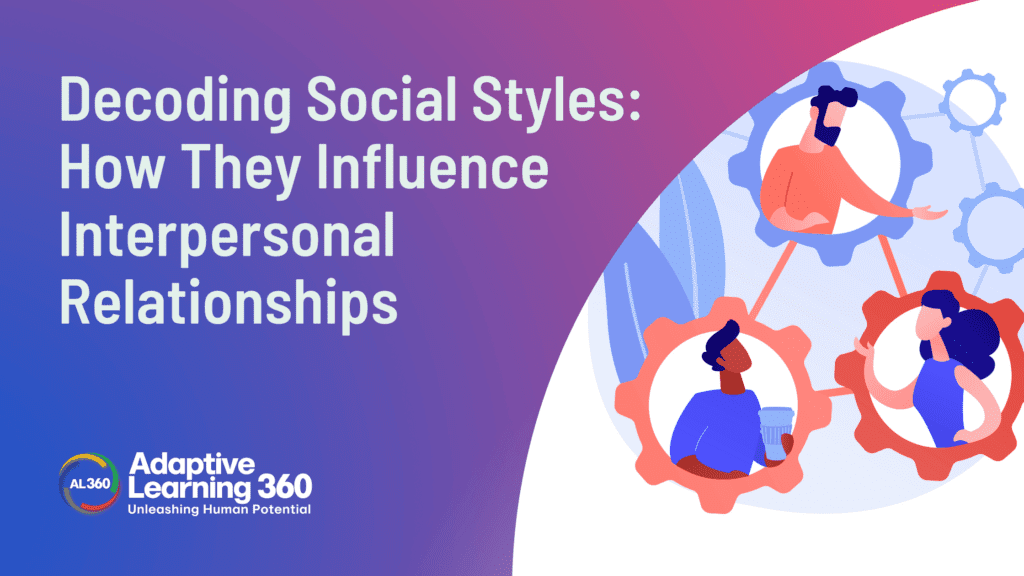Ever found yourself wondering why you click instantly with some people, while
with others, it feels like you’re trying to decode an alien language? The answer
may lie in the concept of Social Styles. Today, let’s take a fascinating journey to
understand the influence of Social Styles on our interpersonal relationships,
and the role of Social Intelligence in this complex tapestry.
If you’re new to the term, Social Styles refer to our preferred ways of
interacting with others. They influence our communication patterns, problem-
solving approaches, and reactions to stress. Unraveling your own and others’
Social Styles can significantly enhance your interpersonal relationships. But
first, let’s briefly address the term ‘interpersonal relationship meaning’.
In essence, interpersonal relationships refer to social connections and
interactions between two or more individuals. They can be formed in various
contexts, such as work, family, friends, and romantic relationships. The nature
and depth of these relationships can be influenced by factors such as shared
interests, communication styles, and, yes, you guessed it – Social Styles!
According to a study by Dr. Roger Reid and Dr. John Merrill, creators of the
Social Style Model, people typically fall into one of four social styles –
Analytical, Driver, Amiable, or Expressive. These styles are determined by our
levels of assertiveness and responsiveness. Their research found that
“understanding your own Social Style and the styles of others can help improve
communication and reduce conflict.”
Let’s take a brief look at these styles:
- Analytical individuals tend to be more task-oriented, focused on details,
and prefer an organized approach. - Driver individuals are usually results-driven, fast-paced, and decisive.
- Amiable people value personal relationships, are supportive, and prefer
cooperation over competition. - Expressive individuals are enthusiastic, like to share their ideas, and are good at motivating others.
Now, imagine what happens when a Driver individual attempts to
communicate with an Amiable one without understanding their differing
styles. Chances are, they might find it challenging to see eye to eye, leading to
potential misunderstandings.
This is where Social Intelligence comes into the picture. Social Intelligence is
our ability to understand and navigate social situations effectively. It allows us
to recognize and respect different social styles, leading to improved
communication and better interpersonal relationships.
Dr. Karl Albrecht, a noted management consultant and author, emphasizes this
point in his work on Social Intelligence. He asserts that “an understanding of
Social Styles, combined with enhanced Social Intelligence, helps individuals
adapt their communication and behavior to suit others’ styles, thereby
improving interpersonal effectiveness.”
So, how does one enhance their Social Intelligence? Well, it begins with self-
awareness, being mindful of our own social style, and understanding how it
impacts our interactions. This self-awareness, coupled with active observation
of others’ social cues, can significantly improve our ability to engage more
harmoniously and effectively with a diverse range of individuals. Moreover,
organizations can integrate Social Intelligence training into their development
programs. This training can equip individuals to understand and respect
different Social Styles better, leading to improved teamwork, less conflict, and
increased productivity.
The impact of Social Styles on our interpersonal relationships is profound. By
improving our Social Intelligence, we can better understand and respect these
differences, leading to healthier and more harmonious relationships. As we
continue to navigate this interconnected world, let us remember that
understanding and respecting our Social Styles, and those of others, is key.
After all, our ability to interact effectively with others is as crucial, if not more,
than our technical skills. By enhancing our Social Intelligence, we can build
stronger bridges in our interpersonal relationships, whether in our personal
lives or at work. So, let’s take this understanding and apply it consciously to our
daily interactions. You might be surprised at how this simple understanding
can transform your relationships for the better.
In the end, it’s not just about understanding the interpersonal relationship
meaning, but about enriching these relationships through the power of Social
Intelligence and an appreciation for diverse Social Styles. In this light, it is worth
mentioning a unique tool called AL360, designed to enhance social intelligence
and foster effective communication. With AL360’s innovative approach, you
can gain insights into your own and others’ social styles, ultimately leading to
more harmonious and productive interpersonal relationships.



